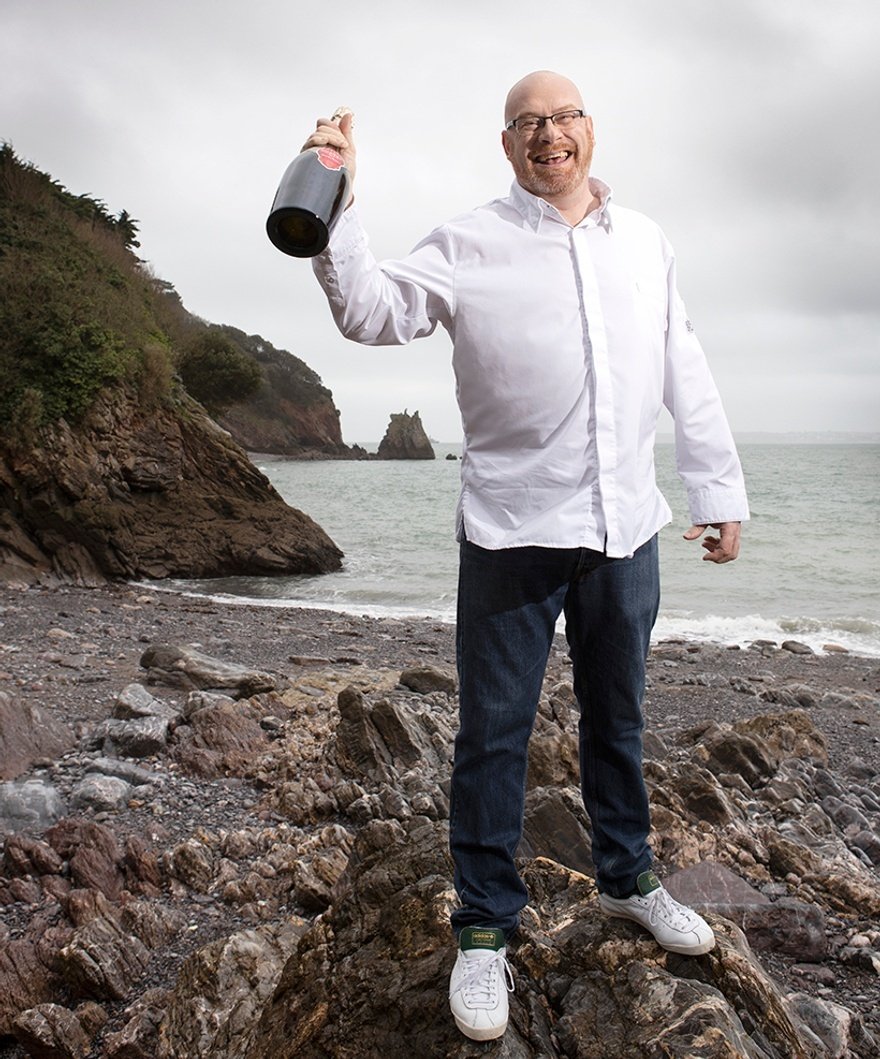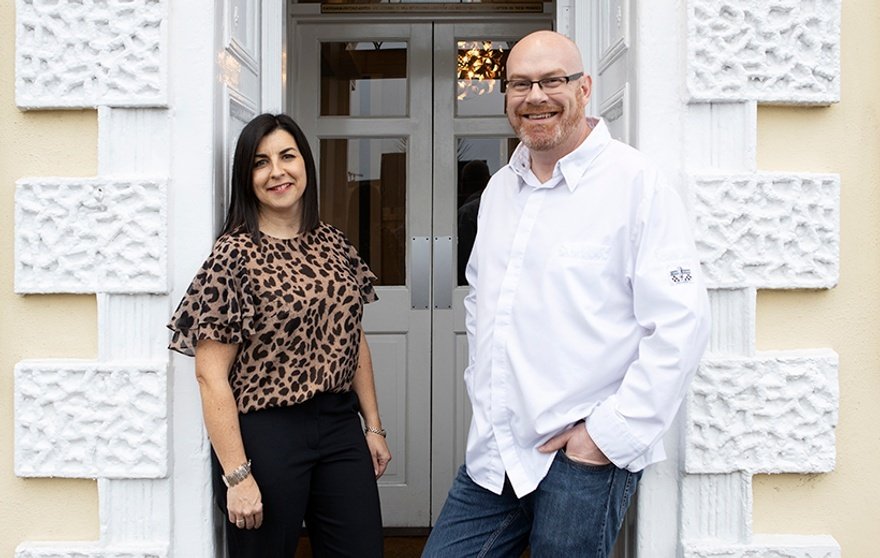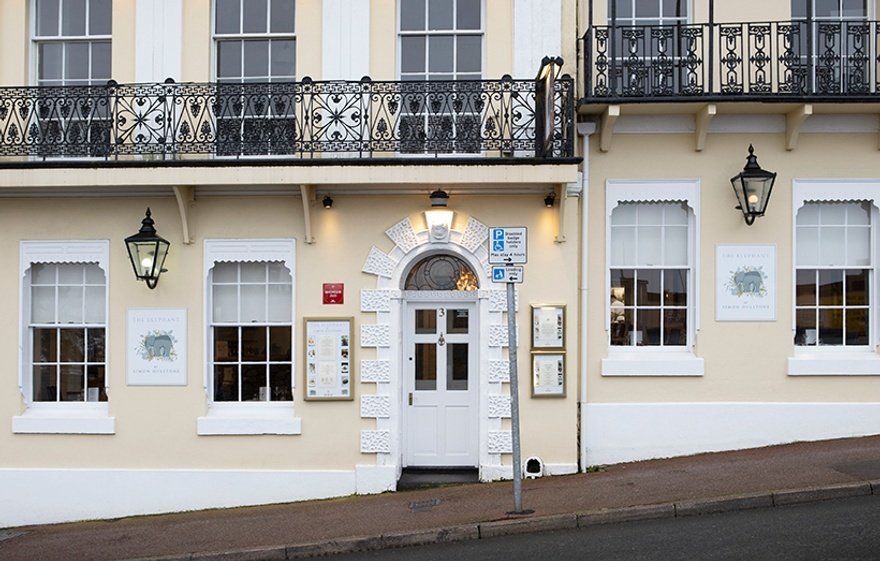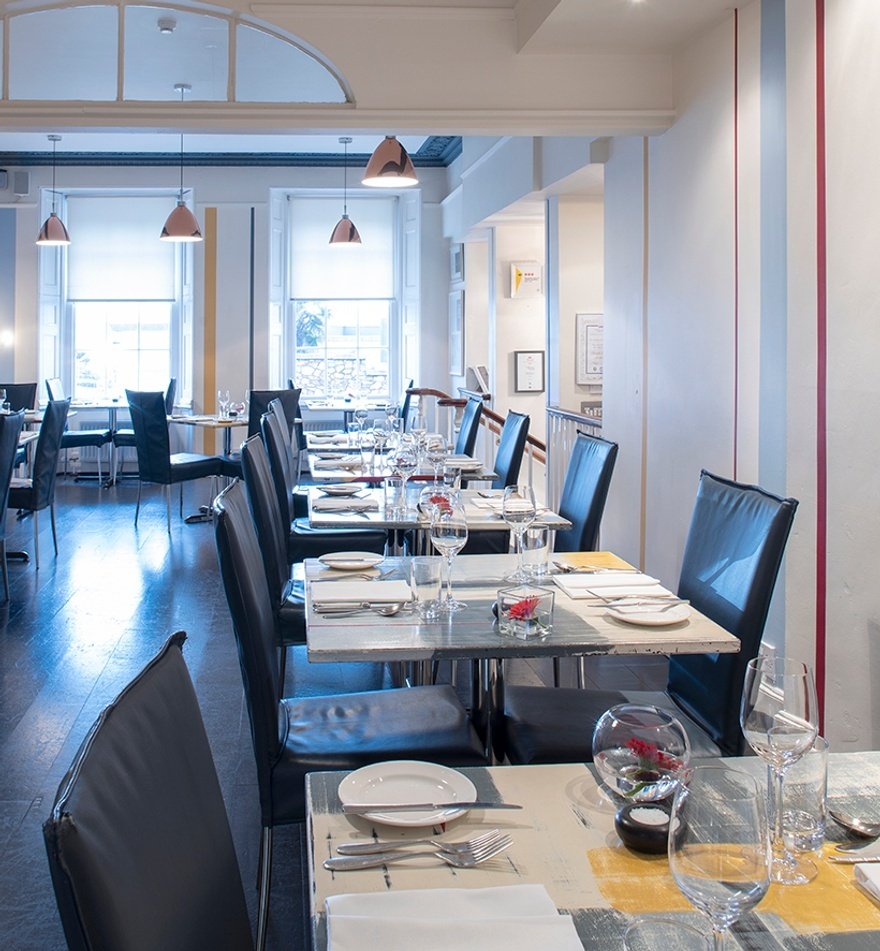It's been 15 years since Simon and Katy Hulstone took over at the Elephant in Torquay, winning their first Michelin star within a few months. Tom Vaughan catches up with the chef to reflect on lessons learned from a decade and a half at the helm, the secret to retaining a Michelin star, and the couple's plans for the future.
A lot can happen in 15 years. Rewind to Britain in 2005, and you'll travel back through five prime ministers, four football World Cups, three Spice Girls reunions, two Wimbledon titles for Andy Murray, one global recession and a total of 428 Michelin stars gained and lost (by our maths).
Through all of that upheaval, Simon and Katy Hulstone's Torquay restaurant the Elephant has been a constant – still holding the Michelin star it was awarded in 2006, making it one of just a small handful of owner-operated restaurants that can boast that sort of consistency.
What's been the secret? "Keeping level-headed," replies Hulstone. "It's such a cliché, but the biggest award for us is having a restaurant with customers in it after 15 years. If it wasn't for the star, we wouldn't have got to where we were 10 years ago. But if it wasn't for us keeping ourselves level-headed, we wouldn't be here now, 15 years on."
Fifteen years running any restaurant will bring its trials and tribulations. But running a Michelin-starred restaurant in a seaside town for over a decade has certainly brought its own challenges, one of which – perversely – was the award of a star after just a few months trading.
"It wasn't something we were working towards or had any idea that we were capable of," reflects Hulstone. "I'd never ever worked in a Michelin-starred establishment. So I think a lot of people at the time thought ‘how the hell have they got that?'"
Naturally, it immediately boosted the profile of the restaurant. But it also brought new problems. The effect of a Michelin star on customer perception is well documented – diner expectations flipping sky-high overnight. "We certainly got a lot of gastro-tourists – people who were expecting white tablecloths and water waiters," says Hulstone.
However, crucial to surviving the star effect wasn't just managing expectations front of house, but back of house as well. Very soon, Hulstone found himself at a crossroads, with the very future of the Elephant at stake.
"Immediately after the star, we wanted to continue to push. We started cooking beyond what the customer – and what Torquay – was expecting. Some of the boys in the kitchen really wanted it to be a three-star restaurant. And it took me a while to realise I'm not a three-star chef. I know my standing. So we had to rein it in. It was hard, but we wouldn't be here now if we'd pushed. We would have lost everything – our home and our business."
A balancing act
The dilemma goes straight to the heart of the chef-patron's lot – the balancing act of culinary ambition and business sense. Getting the right blend is everything, and it's an art that many up-and-coming chefs seem to lack these days, says Hulstone.
"This also sounds awful, but there are a lot of inexperienced restaurateurs who don't have the knowledge of what goes on in the bank accounts. They are spending investors' money without realising that investors want stuff back.
"I see some beautiful food on Instagram and I think: how are they paying for that? There are quenelles of caviar and bits of turbot. They're not ingredients that we can ever afford! We wouldn't be around if we did that. And often these guys aren't, after a while."
In choosing to put his customers over his team's culinary ambitions, did Hulstone resign to losing the young chefs that had helped win him the star? "It was about keeping the team motivated in other ways – to make sure we weren't standing still; to constantly cook what is in season," he explains.
"But I always knew they were just ambitious young chefs who wanted to get as much knowledge from me as possible, then move onto the next chef and take that knowledge. Now one of them has just got two stars [Jordan Bailey at Aimsir in County Kildare, Ireland]!"
Back to the start
Instead, Hulstone reverted to the family-orientated ethos that he and Katy first envisioned for the restaurant, after seeing an advert in The Caterer for a fine-dining chef in his adopted hometown of Torquay (he moved there aged 11 when his father, also a chef, got a job in a nearby hotel).
"I actually couldn't believe that there was a fine-dining restaurant in Torquay! So I came there for lunch. And I thought, ‘Wow. Nice little place, but the food's rubbish. I can do better than this'." He interviewed, got the job, and brought his whole team with him from his previous position at Cotswold House in Chipping Campden, Gloucestershire.
The same informal, family-friendly philosophy that launched the Elephant 15 years ago is still at its heart today – a lunch might see a family with young kids next to a pair of surfers in wetsuits, next to foodie mini-breakers having the tasting menu. Hulstone's ingredient-led cooking underpins everything, with the restaurant's own farm now adding an extra dimension to the food.
"We are here for the customers and we're cooking food that customers want to eat," he explains. "We add bits of modern touches, but we don't stray away from the quality of ingredients. It's consistent, good cooking in a family-run great atmosphere that people want to come back to."
For a while, Hulstone dealt with the Michelin-obsessed gastro-tourists by opening the Room – an additional first-floor fine-dining restaurant that played to customers' expectations of a starred experience, complete with white tablecloths and tasting menus. But that closed in 2016. Was its closure driven by finances or changing customer tastes? "Neither – staff. There just wasn't enough of them to run both restaurants."
Did he notice any repercussions from its closure? "There was no difference at all. The locals understood. The people at Michelin understood when we spoke to them and explained the situation. And like they've always said to us – it's what's on the plate that is important for us."
If it wasn't for the star, we wouldn't have got to where we were 10 years ago. But if it wasn't for us keeping ourselves level-headed, we wouldn't be here now, 15 years on
Rising to the challenges
Finding the right staff has undoubtedly been one of the Elephant's biggest challenges over the years. In an industry that struggles with recruitment at the best of times, Torquay isn't high on the list of hospitality hopefuls.
"The kitchen has probably been the easiest to recruit," Hulstone explains. "Front of house has been a real struggle. We don't get the Eastern Europeans that we used to get. They were amazing for the industry. We don't get CVs at all any more or even anybody looking for extra weekend work. There's just a lot of very lazy people out there!" How do he and Katy cope? "We just run around more!"
The other recurring challenge has been learning to cope with the feast-and-famine nature of a seasonal seaside town. "We did nobody for lunch today. Not one person. Which, you know, is pretty scary. But we know that we're going to get absolutely slammed at the weekend. But the big thing is, after 15 years, we know when it's going to be like this. We can look back at the figures and go: it's exactly the same as last year, and we got through it."
Has there been a time in the last 15 years when he's been genuinely concerned for the Elephant's survival? "The recession was scary. It was just really, really quiet. That was the hardest part of it. What saved us from it was the farm and being able to use ingredients in different ways. It bought a lot of skill out of the kitchen – braising shins of beef and cheeks and things like that. And it meant we could get a good GP for a cheaper cut."
The Southdown farm in Brixham, owned by Hulstone's former business partners Peter Morgan and Friederike Etessami, grew out of the tough times of the recession. As a means of adding an extra dimension to the kitchen, Hulstone began growing his own fruit, herbs and vegetables on Morgan and Etessami's land.
Now, he employs a full-time farmer and has six polytunnels and an established orchard. "We grow as much as we can. It gets us through the growing season. Then we pickle and jam and coulis and ferment to get us through the winter. It's been another learning curve and a great education."
Has it had a marked effect on his kitchen's GP? "We probably don't make any money at all from the farm. But what we do get is story – a lot of it was a story. It's added a PR value to the restaurant that we didn't have before. We're able to talk about things we've grown ourselves. It's definitely added something special to our menu."
Even though Hulstone and his wife bought out Morgan and Etessami's shares in the Elephant in 2017, the farm still supplies the restaurant. The purchase also marked the first time since they took over that the Hulstones owned the restaurant outright.
"From day one, Peter and Friederike left Katy and I to run the restaurant as if it was our own. They assisted us, helped us, guided us, but they weren't restaurateurs. We were in the best position – we were given a school in which to teach ourselves."
On the market
However, in 2017, Morgan and Etessami decided to sell, and, for the first time in 12 years, the couple faced the possibility of losing the restaurant they had built from the ground up. "That was our biggest fear. I wouldn't want to be at the Elephant if there was an owner above me. The option was always there for us to move away if it did go for sale."
That "fear" led the couple to buy local tea-shop Burridge's as a contingency. "I wanted to have somewhere that we could take my name and my cooking to if we lost the Elephant. It was close enough that we could say: ‘The chef's left the Elephant but he's down here now'."
I'd really like one of my members of staff to take it over from me. It'd be so cool if I could pass it on to someone that's been with me, someone who would continue its values
In the end, it never came to it and now the Hulstones – along with Simon's father – run Burridge's as "their dirty little secret": "We enjoy it. You can't come to Devon and not have a cream tea. So that's sort of our selling point: white China, nice big fluffy scones, clotted cream and jam done the right way round.
"But when there are no tourists, locals don't go out for a cream tea. We'd like to do something a bit more advanced with it, but it is so seasonal. You have five months of the year to make money to lose for the next several months of the year."
As it worked out, the Elephant never hit the open market – the Hulstones were given first refusal on the purchase and raised the money through savings and a mortgage to buy out Morgan and Etessami.
What was it like to finally own the business – scary? Liberating? "It was a bizarre feeling because we handed over a lot of money, but didn't receive anything, because we already had it. We know every nook and cranny of the restaurant, we've purchased everything in it. But in other ways the business is ours now – we can sell it."
In the short term, there's a full refurbishment on the cards, to "let everyone know we're here to stay". In the long term, has Hulstone given any thought to when he might step away from the stove?
"I'd really like one of my members of staff to take it over from me," he explains. "It'd be so cool if I could pass it on to someone who has been with me, someone who would continue its values. Or one of my children.
"I'm 45 and I feel like I'm getting old in the kitchen. So it'll be a maximum of another 10 years. And then I'll sit back and enjoy myself a little bit," he says, before getting the better of himself: "But I'd stay in the industry, of course."
Simon Hulstone on culinary competitions
Fifteen years holding a Michelin star is a remarkable achievement by anyone's books. However, there is another long-running professional passion in Simon Hulstone's life: culinary competitions.
What are your most significant competition achievements?
Roux Scholarship winner 2003. National Chef of the Year winner 2008. Competing at Bocuse d'Or 2008, 2010 and 2011. Captain of the British Team at the Culinary Olympics 2012. Captain of the English Culinary Team at the Culinary World Cup in 2010 and 2012. World Skills Olympics winner in 1995. Three other world championships… I've got a lot of medals!
What's fuelled the life-long obsession?
Winning! I don't like losing. My father was a competitor, so it is in the blood. But I soon realised that winning things wasn't just a medal; it could be for money or a holiday. I think for about 10 years, I don't think I ever paid for a holiday, I just won them!
When you took over at the Elephant, did you feel like competitions might become a distraction?
Anytime I've done a competition, it's never been during work time. So it was a hobby, like playing football on a Sunday morning. But what it did do was bring a lot of PR to the Elephant. People in the industry might have known who I was when I moved down here, but the residents didn't. So winning a competition meant getting in the local paper and people talking about you.
What skill sets do competitions bring to a young chef?
Motivation, a military sort of thinking, organisation. And you get to learn about defeat as well. You can't win every competition. So you get to see where your standing is as a chef in the industry. On top of that, you get to learn from other chefs; you get to meet other chefs.
Which competition success was the most transformative for you?
The Roux scholarship, without a doubt. It is fundamentally the best thing that's ever happened to me. The camaraderie, the family thing, the prize, the continual prizes – you don't just win one prize, every year we go on great trips. If anyone ever said to me they wanted to enter the scholarship, I'd say unequivocally "go for it!".
Quick-fire questions
Over the past 15 years what's been your…
Best meal? First time I ate at Noma, Copenhagen, in 2008
Best dish?
Steamed truffle bun at Benu, San Francisco
Most overrated ingredient?
Sriracha
Most overrated culinary trend?
Caviar balls
Most admired hospitality professional?
The Roux family
Scariest moment?
My bike accident in 2011 when I came off my motorbike on the dual carriageway and broke fingers, arms, ankle, legs. I was still back at work the next day, which was a bit stupid.
Proudest moment?
Buying the restaurant, and watching Jordan [Bailey, of Aimsir, Co Kildare] get two stars this year was amazing.
Continue reading
You need to be a premium member to view this. Subscribe from just 99p per week.
Already subscribed? Log In













